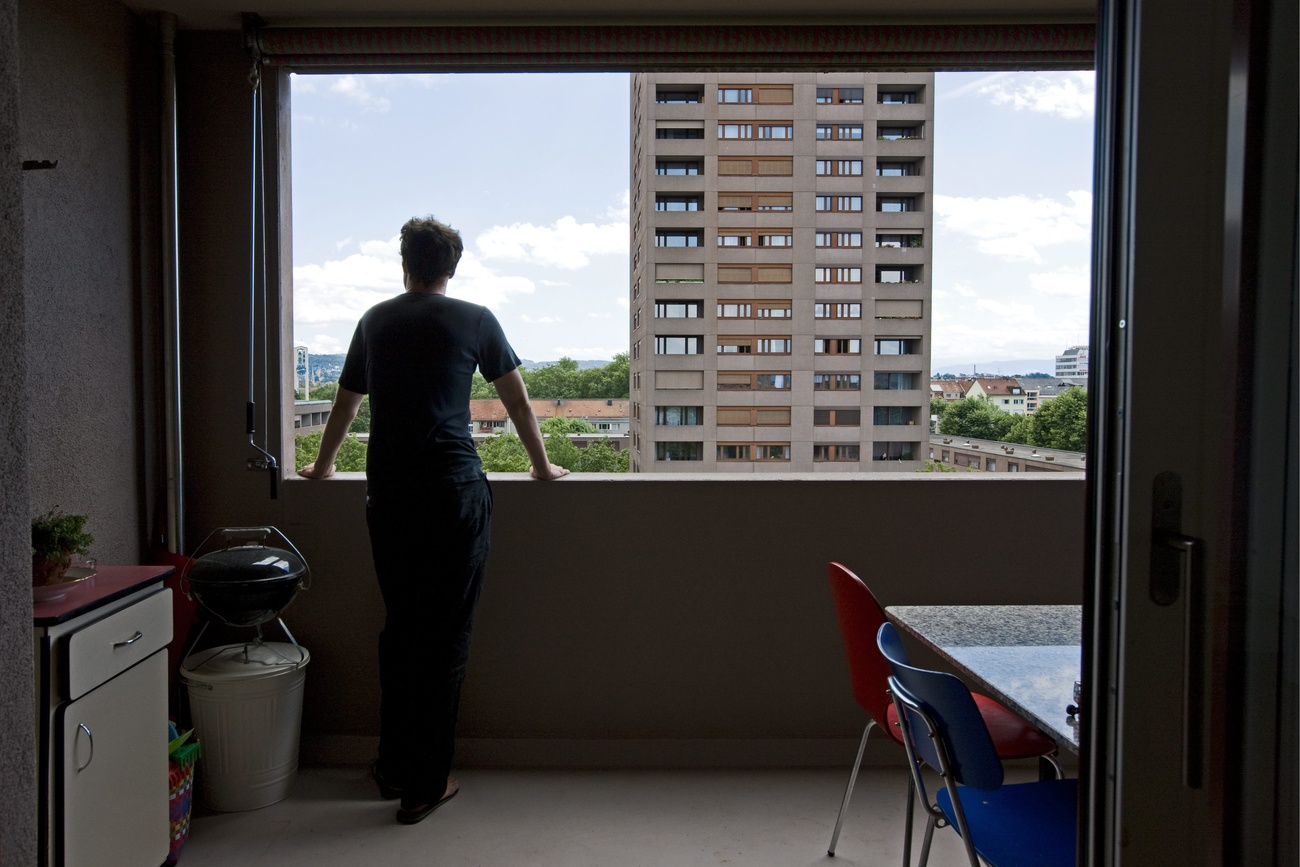
Swiss reject plans for bigger motorways and extra rights for landlords

No to bigger motorways, no to easier evictions and tighter subletting rules, yes to a new healthcare financing model: Swiss voters had their say on Sunday on a set of ballots which went right down to the wire.
Pollsters had predicted a tight day, and in the end they were right. Of the four issues up for vote on Sunday, the biggest winning majority was 53.8% (eviction rules). And while Swiss authorities managed to avoid defeat on all four issues – another outcome mooted beforehand – they did come out with a black eye on the headline vote: a much-vaunted expansion of the country’s motorway system. Voter turnout was 45%.
Motorways – voters not impressed by CHF5 billion expansion project
The government’s road infrastructure plans have hit a brick wall: after a tight race, 52.7% of voters rejected on Sunday a CHF5 billion ($5.6 billion) motorway expansion project. The plan, approved in parliament last year, would have involved widening or building new roads at six key points on the country’s motorway system, notably near the capital, Bern, and on a busy stretch between Geneva and Lausanne.

On Sunday, the Green Party hailed a historic rejection of what it called “an out-of-date transport policy”. Along with left-wing and ecologist groups, the Greens campaigned with arguments about the environmental impact of the project and the fear that bigger roads would merely spawn more traffic. They now want the funds to be spent on public transport, active mobility, and renovating existing motorways.
Backers of the project had argued that traffic jams had ballooned in recent years and investment was needed to keep pace with the growing Swiss population. The project should be seen as part of an overarching strategy which already includes investment in public transport and other forms of mobility, Transport Minister Albert Rösti told Swiss public television, SRF, during the campaign.
But initial support for the project faded during the campaign, polls found, leading to a final defeat that one right-wing politician described on Sunday as a “kick in the teeth”. Another Centre Party politician involved in the “yes” campaign, Fabio Regazzi, told SRF radio that the result revealed “a certain shift” among the Swiss population. A few years ago, such a vote would easily have been accepted, Regazzi reckoned.
Tight votes for tenancy modifications
A majority of voters (53.8%) also rejected on Sunday a proposal to make it easier for landlords to terminate leases early in order to use a property for their own purposes. Meanwhile, 51.6% turned down a plan for tighter controls for subletting apartments and other property – both residential and commercial.
The two issues have gained much attention, as tenancy law affects the majority of Swiss. Around 60% of the population – the highest percentage in Europe – rents a home.
The proposal to ease eviction rules was rejected in almost all French-speaking cantons, with particularly high opposition in Geneva (67.8% of the population), which suffers from a chronic housing shortage.

More
Voters to decide if Swiss landlords need extra rights
Sunday’s vote follows parliament’s ratification last year of the two tenancy law amendments, initiated by right-wing politicians, in favour of landlords. Following this, Asloca, the powerful national tenants’ association, launched a referendum, criticising the changes as an attack by the property lobby.
Opponents of the eviction change had warned that it would make it easier for landlords to terminate leases and throw tenants out of their apartments under the pretext of personal use. They accused them of wanting to take advantage of the housing shortage and re-let apartments at higher prices. Real estate circles and the right had argued that the legal revisions were targeted and fair and clarified the current law.
Under the subletting provision, landlords would have had greater leeway to prevent tenants from subletting their apartment. Landlords would have been able to refuse “abusive” subletting, for instance, if it had lasted longer than two years or if an apartment had been sublet at too high a price.
The Swiss public broadcaster, SRF, described the results as “a warning shot across the bows” of the centre-right parties that had initially backed the tenancy changes.
“People are critical of interventions in tenancy law in favour of landlords,” it said. Parliament is set to discuss further elements of tenancy law in 2025. New rules that would make it more difficult for tenants to take legal action against high rents will be debated. So far, a majority in parliament been emerging for the changes. But today’s vote could prompt some politicians to “reconsider the situation”, wrote SRF.
Healthcare – voters approve rare reform to the system
Finally, 53.3% of voters accepted a complex healthcare proposal aimed at boosting the volume of outpatient procedures and disincentivising costly inpatient – i.e. with at least one night spent in hospital – care.
The result means that a new financing model will enter force in the coming years, which will see cantons and health insurance firms fund the different types of treatment according to a standardised model. Currently, cantons pay 55% of inpatient costs, but don’t contribute at all to outpatient care; in the future, the division of costs for both will be the same – at least 26.9% by cantons, at most 76.3% by insurers.

More
Will Swiss voters accept standardised financing of healthcare?
Regine Sauter from the centre-right Radical-Liberal Party said on Sunday that the result was a “milestone for the Swiss healthcare system”. Not only will it boost outpatient treatment; it also shows that the system is “capable of reform”, she told public television, SRF. As with pensions, proposed overhauls to the Swiss healthcare system often have a hard time getting past voters.
Opponents, who did not contest the benefits of outpatient care, argued that the reform would not do enough to tackle the central problem: the steady year-on-year rise in the cost of compulsory insurance. Trade unions, who launched the referendum against the change, also warned that more influence for private insurers in nursing homes could have a negative impact on care.
And while they managed to convince a majority in the French-speaking part of Switzerland, overall they were edged out thanks to a larger “yes” vote in German-speaking regions. Meanwhile they saw themselves as clear underdogs: they were up against “one of the most powerful lobby groups in Switzerland” – health insurers and associations, Social Democrat politician David Roth told SRF.
More

More
Newsletters

In compliance with the JTI standards
More: SWI swissinfo.ch certified by the Journalism Trust Initiative

































You can find an overview of ongoing debates with our journalists here . Please join us!
If you want to start a conversation about a topic raised in this article or want to report factual errors, email us at english@swissinfo.ch.